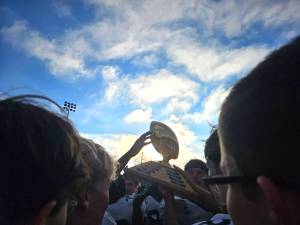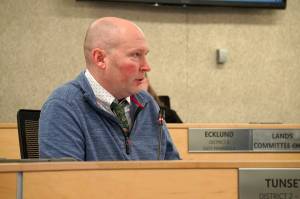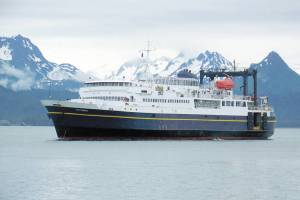8 candidates file for District 30 House seat
Published 3:20 am Friday, June 3, 2016
The central Kenai Peninsula will host the most contested Alaska State House race in the fall.
Eight candidates have thrown their hats into the ring for the seat in House District 30, which includes Kenai, K-Beach, Soldotna and Ridgeway. Many are familiar names in local politics: current Kenai City Manager Rick Koch, current Kenai Peninsula Borough Assembly representative Gary Knopp, Soldotna City Council member Keith Baxter and former assembly representative Kelly Wolf have filed for the seat in the Republican party. Shauna Thornton, the Student Government advisor at Kenai Peninsula College and a 2014 candidate for the District 30 seat, is running for the Democratic Party.
J.R. Myers, who ran against current Gov. Bill Walker for the governor’s seat in 2014, has filed as a candidate for the Alaska Constitution Party. Two others, Don Hopkins and Daniel Lynch, both of Soldotna, are unaffiliated as yet.
The seat will be up for grabs after incumbent Rep. Kurt Olson announced his intention not to run again. The four Republican candidates will compete in a primary race on Aug. 16, and the final candidates will face off in the general election on Nov. 8.
All the candidates said they were glad the race was so contested and were primarily focused on the state’s fiscal future.
This is Koch’s first time running for a state seat, though he has been involved with the Legislature for many years, both in his time as Kenai’s city manager and in positions across the state.
He said he has developed relationships with many of the current and former legislators and has been able to bring those relationships to bear over time.
“Alaska has been very, very good to me and my family,” Koch said. “It has defined who I am. The experience I’ve gained from almost 40 years in the workforce, developing those relationships in the state, I think it’s something valuable and will represent our district well and the state well in a very broad perspective.”
One provision for him in determining a direction for the state in the future is a spending plan that would establish a cap on how much revenue the state actually spends and leave the leftover in case of deficit situations, he said.
“To put a spending plan in place … and then we know what we’re going to spend, we can create long-term revenue plans that support that spending plan,” Koch said. “The absence of a spending plan leaves us always starting at ground zero.”
Baxter was the first candidate to file, turning in his letter of intent in January, though he said he was ready to file in August.
He said if he is elected to Juneau, he is willing to take all new fiscal options into consideration, but he said he likes the option of using the permanent fund earnings — it spreads the burden equally among Alaskans and brings some of the money that would be paid in federal taxes back into the state coffers.
“My campaign is all about moving forward,” Baxter said. “I know there have been some holdouts thinking we can wait for the price of oil to rebound… in the next Legislative session, we can’t just wait for those things to happen.”
Wolf, who previously served in the Legislature, said one of his biggest goals is to protect the Permanent Fund.
He said he had heard the same rhetoric about using Permanent Funding earnings from then-governor Frank Murkowski during his previous term as a state representative in 2004, and did not think it had merit then or now.
Instead, he said he preferred to look at reducing the size of government and raising some taxes.
“I don’t believe in it until we make some serious cuts in government that we need to tap the Permanent Fund,” Wolf said. “I think we need to first look at reducing the size of our government to where it serves the people of Alaska, and then we need to look at taxes. As a former state legislator, I already know that it’s a lot more fun to say yes than it is to say no. It takes guts, but I’m not afraid to take point.”
Knopp ran for the House seat in 2012. He said he is more familiar with the state and local issues after winning a seat on the borough assembly last fall and enjoys serving on a local level, but is concerned about the state’s revenue plans. He said next year will be a challenging year in the Legislature and that he would look for more efficiencies in the state government before looking to raise additional taxes.
“I think the use of the (Constitutional Budget Reserve) and the oil and gas tax credit (funds) are reasonable,” Knopp said. “That’s where I draw the line. The problem is that if you implement taxes, you constantly raise them. I think there’s still some more efficiencies in state government that they can address.”
Myers also said he opposed about the use of the Permanent Fund earnings and raising taxes.
He turned his attention mostly toward reducing spending to meet revenue, bringing more governance back to a local level.
He said he also supported moving the state capitol from Juneau to somewhere more accessible to most Alaska residents, calling Juneau “a natural moat” that blocked most Alaska residents participating in the legislative process during regular session.
“We have to realize that the oil boom is over as far as the government spending goes,” Myers said. “We have one of if not the highest state government spending per capita, which is just not sustainable. … They have confused the state of Alaska with the government of Alaska. The state of Alaska has many more interests as a much more broad definition. They are preparing to sacrifice the rest of Alaska to prop up an unwieldy government.”
Thornton said she wants the Legislature to consider new approaches to the size of government and be willing to have the difficult conversations about the state’s future.
She said the government should be a facilitator between people and should encourage them to be involved, not discouraged from engaging with the government.
The state should look at how it is allocating its budget and cut down on unnecessary projects and other endeavors as well, she said.
“We have an allocation problem more than we have a budget problem,” Thornton said. “Now we’re looking at the Wells Fargo building, the Bridge to Nowhere, projects we don’t need. We’re not in a position to do that. Of course, you have to look at matching spending and because we heavily funded by the feds, we get that, but at the same time, you can’t spend money that you don’t have.”
Lynch and Hopkins could not be reached as of press time.
All the candidates are listed on the Alaska Division of Elections’ website at elections.alaska.gov.
Reach Elizabeth Earl at elizabeth.earl@cmg-northwest2.go-vip.net/peninsulaclarion.




